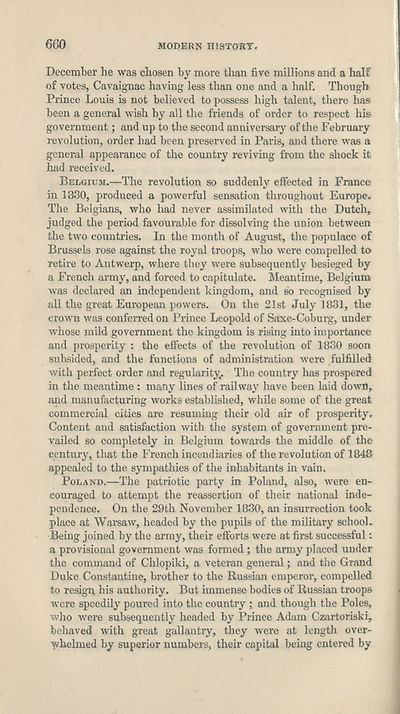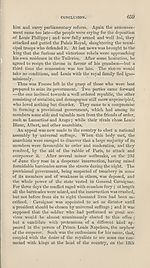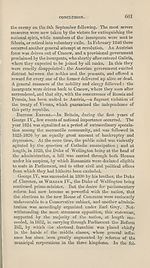Download files
Complete book:
Individual page:
Thumbnail gallery: Grid view | List view

660
MODERN HISTORY*
December he was chosen by more than five millions and a half
of votes, Cavaignac having less than one and a half. Though
Prince Louis is not believed to possess high talent, there has
been a general wish by all the friends of order to respect his
government; and up to the second anniversary of the February
revolution, order had been preserved in Paris, and there was a
general appearance of the country reviving from the shock it
had received.
Belgium.—The revolution so suddenly effected in France
in 1830, produced a powerful sensation throughout Europe.
The Belgians, who had never assimilated with the Dutch,
judged the period favourable for dissolving the union between
the two countries. In the month of August, the populace of
Brussels rose against the royal troops, who were compelled to
retire to Antwerp, where they were subsequently besieged by
a French army, and forced to capitulate. Meantime, Belgium
was declared an independent kingdom, and so recognised by
all the great European powers. On the 21st July 1831, the
crown was conferred on Prince Leopold of Saxe-Coburg, under
whose mild government the kingdom is rising into importance
and prosperity : the effects of the revolution of 1830 soon
subsided, and the functions of administration were fulfilled
with perfect order and regularity. The country has prospered
in the meantime : many lines of railway have been laid down,
and manufacturing works established, while some of the great
commercial cities are resuming their old air of prosperity.
Content and satisfaction with the system of government pre¬
vailed so completely in Belgium towards the middle of the
century, that the French incendiaries of the revolution of 1848
appealed to the sympathies of the inhabitants in vain.
Poland.—The patriotic party in Poland, also, were en¬
couraged to attempt the reassertion of their national inde¬
pendence. On the 29th November 1830, an insurrection took
place at Warsaw, headed by the pupils of the military school.
Being joined by the army, their efforts were at first successful:
a provisional government was formed ; the army placed under
the command of Chlopiki, a veteran general; and the Grand
Duke Constantine, brother to the Russian emperor, compelled
to resign his authority. But immense bodies of Russian troops
were speedily poured into the country ; and though the Poles,
who were subsequently headed by Prince Adam Czartoriski,
behaved with great gallantry, they were at length over¬
whelmed by superior numbers, their capital being entered by
MODERN HISTORY*
December he was chosen by more than five millions and a half
of votes, Cavaignac having less than one and a half. Though
Prince Louis is not believed to possess high talent, there has
been a general wish by all the friends of order to respect his
government; and up to the second anniversary of the February
revolution, order had been preserved in Paris, and there was a
general appearance of the country reviving from the shock it
had received.
Belgium.—The revolution so suddenly effected in France
in 1830, produced a powerful sensation throughout Europe.
The Belgians, who had never assimilated with the Dutch,
judged the period favourable for dissolving the union between
the two countries. In the month of August, the populace of
Brussels rose against the royal troops, who were compelled to
retire to Antwerp, where they were subsequently besieged by
a French army, and forced to capitulate. Meantime, Belgium
was declared an independent kingdom, and so recognised by
all the great European powers. On the 21st July 1831, the
crown was conferred on Prince Leopold of Saxe-Coburg, under
whose mild government the kingdom is rising into importance
and prosperity : the effects of the revolution of 1830 soon
subsided, and the functions of administration were fulfilled
with perfect order and regularity. The country has prospered
in the meantime : many lines of railway have been laid down,
and manufacturing works established, while some of the great
commercial cities are resuming their old air of prosperity.
Content and satisfaction with the system of government pre¬
vailed so completely in Belgium towards the middle of the
century, that the French incendiaries of the revolution of 1848
appealed to the sympathies of the inhabitants in vain.
Poland.—The patriotic party in Poland, also, were en¬
couraged to attempt the reassertion of their national inde¬
pendence. On the 29th November 1830, an insurrection took
place at Warsaw, headed by the pupils of the military school.
Being joined by the army, their efforts were at first successful:
a provisional government was formed ; the army placed under
the command of Chlopiki, a veteran general; and the Grand
Duke Constantine, brother to the Russian emperor, compelled
to resign his authority. But immense bodies of Russian troops
were speedily poured into the country ; and though the Poles,
who were subsequently headed by Prince Adam Czartoriski,
behaved with great gallantry, they were at length over¬
whelmed by superior numbers, their capital being entered by
Set display mode to:
![]() Universal Viewer |
Universal Viewer | ![]() Mirador |
Large image | Transcription
Mirador |
Large image | Transcription
| Antiquarian books of Scotland > Education > Elements of universal history on a new and systematic plan > (680) |
|---|
| Permanent URL | https://digital.nls.uk/127588300 |
|---|
| Description | Thousands of printed books from the Antiquarian Books of Scotland collection which dates from 1641 to the 1980s. The collection consists of 14,800 books which were published in Scotland or have a Scottish connection, e.g. through the author, printer or owner. Subjects covered include sport, education, diseases, adventure, occupations, Jacobites, politics and religion. Among the 29 languages represented are English, Gaelic, Italian, French, Russian and Swedish. |
|---|

